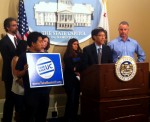When a group of unions and other organizations interested in reforming the University of California decided they needed a new tactic, they did what they do best: collectivize.
Last Wednesday, Take Back UC, a campaign dedicated to bringing together reform groups from across California and push for institutional change in the University, went live.
The UC’s largest union, the American Federation of State, County and Municipal Employees Local 3299, which represents service and patient-care workers, started the project and worked to recruit collaborators.
In total, according to AFSCME 3299, about 17,000 individuals are wrapped up in this campaign, including members of the UC Student-Workers Union and a host of other groups.
This push is an opportunity for those looking for change within the UC to take a few hints from the University itself. Instead of committing the future of the movement to the uncertain whims of numerous interest groups, the most tangible good could be achieved by allowing AFSCME 3299 to lead the initiative.
Consider the structure of the UC. The top department, the Office of the President, is responsible for handling intra-campus affairs, statewide issues and lobbying for the University.
Under UCOP are 10 campuses, each with its own mission, goals and endeavors.Each operates with autonomy, yet is answerable to UCOP.
Much in the same way, Take Back UC could operate with a centralized authority in AFSCME 3299, which would work in conjunction with the other groups involved to better advance the most pressing issues at that moment.
The other organs of the coalition, the individual groups, can still work for their own causes. However, consolidating the voices of 17,000 people on a shared goal can cross that issue off the list faster.
Once a particular goal is accomplished, Take Back UC would return to its constituents and begin a new campaign.
Todd Stenhouse, spokesman for AFSCME 3299, said the union has come to view itself as more than a lobby for service and medical workers. As the largest collective bargaining voice in the system, it believes it has a responsibility to help all constituents of the UC, he added.
AFSCME 3299 does serve specific constituents – namely service and patient care personnel – and some may worry that the issues facing these groups could take precedent.It’s not an unfounded concern either.
Currently, on the Take Back UC website, the only direct actions available to the public are two petitions, one calling for safer medical staffing and another for administrative pension reform, both campaigns AFSCME 3299 itself is focusing on.
The union contends that the lack of options is due to the website’s infancy. But Josh Brahinsky, the recording secretary at the UC Santa Cruz chapter of the UC Student-Workers Union, said that so far, efforts to expand the focus of the movement have been met with an overwhelmingly positive response.
Which addresses another point: With a centralized approach, could AFSCME abuse its power in the same way it sees UCOP doing? Given the enthusiasm surrounding the effort and the organization’s inclusiveness, this seems unlikely.
Decentralization is a noble but Pyrrhic cause. It brings to mind another leaderless campaign of recent memory: the Occupy movement.
Occupy, which swept through the country after the 2008 financial collapse, had a loose common thread – to decrease economic inequality – and fizzled due to a lack of central control and definite goals.
In the same way, Take Back UC could suffer a similar fate. It has a common thread – University reform – but could fall prey to competing fancies.
Proponents of the decentralized approach have pointed to the success of such a movement in passing Proposition 30 last year. However, that was a grassroots campaign with a specific goal. Platforms are great, but sometimes specificity is better.
Take Back UC is situated in a sweet spot.It has momentum, vision and courage, but it also has history to learn from.
By learning from the past, AFSCME 3299 has the potential to bring a single voice to a wide, populist movement.These groups stress the importance of education; let us hope they can do a little learning themselves.
